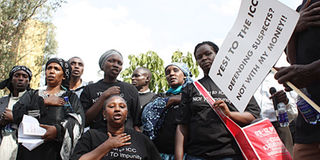Kenya’s bid to defer ICC cases faces more hurdles

A section of the civil society protest at Freedom Corner in Uhuru Park, Nairobi on January 18, 2011 against Kenya's proposal to withdraw from the Rome Statute and as member of the International Criminal Court (ICC). Photo/FILE
Parliament may be forced to withdraw a motion in the House seeking to repeal the International Crimes Act if the bid to secure a deferment of the ICC case is to be taken seriously.
Justice minister Mutula Kilonzo, in an interview with the Saturday Nation, said that Kenya has to be serious with her decisions.
“We cannot pass a resolution in the House to withdraw from the ICC, draft a Bill to repeal the International Crimes Act and at the same time ask the international community to support us in seeking a deferral,” said Mr Kilonzo.
Under Section eight, the International Crimes Act says offenders can only be tried at the High Court and if repealed Kenya can no longer turn to the ICC and cannot prosecute such offenders internally.
“My advice would be when you are in a hole, stop digging. Technically we are reverting to the dark ages of exposing our citizens to customary international law,” warned Mr Kilonzo.
Although the African Union has supported the request, some countries are not comfortable with the decision.
The UK, for instance, is not convinced on the motive to walk away from the ICC when Kenya had all the time to form a local tribunal.
When the country opted for the ICC, Britain supported the move practically and politically. But there is an olive branch.
Just before Kenya tabled her request at the AU summit in Addis Ababa, the President of the Assembly of Rome Statute Christian Wenaweser jetted in and advised the country to directly deal with the ICC and discuss how it wants its case handled. (Read: Only ICC can save you, Kenya told)
According to the Foreign Affairs ministry, Mr Wenaweser gave the government a number of conditions that if met could have the Kenyan case handled as the government proposes.
The conditions include establishment of a court with international credibility, appointing a prosecutor who is above reproach and ensuring there is a court committed to the rights of the victims and the perpetrators of the 2008 post-election violence.
It is understood that Mr Wenaweser said the Rome Statute gave more preference to local courts and therefore urged Kenya to make a serious commitment by creating a court that meets the international threshold in two months.
“The President of the Assembly of Rome Statute said that he would be eager to see Kenya handle the case as long as the local courts were sound and able to deliver justice to all,” said Mr Onyonka.
There are five members with veto power at the Security Council. They are Britain, France, Russia, China and the United States.
The British High Commissioner to Kenya Rob Macaire said that by the country walking away from its treaty obligations, it was making a clear statement in support of impunity.
“We welcome the formation of a local tribunal but it should serve as a complementary process to the ICC,” said the envoy.
Mr Macaire termed as a “very difficult decision” Kenya’s efforts to essentially end the ICC role in post-election violence crimes.
He said the country’s reputation, its ability to positively influence others and its status in the international community was at stake.
But he could not give Britain’s position if the country turned to the UN Security Council to seek a deferment of the ICC prosecution of six Kenyans, saying he did not wish to pre-empt decisions of the Council.
“It is important to note that ICC is independent — it is not for the UN Security Council to make decisions on behalf of the Court,” said the envoy.
Understandably, Kenya intends to argue for deferral under Chapter seven of the UN Charter, which requires a “threat to international peace or security” for the Security Council to act.
By definition, the request means that it has to be judged that any such threat would occur outside of Kenya’s borders. This is the sort of question that the Security Council may have to consider.
If the Security Council is satisfied that there is need defer to preserve international peace and security, then it will request the ICC to do so.
A request from the state to the Council can be done at any time before or after prosecution has began but it has to be justified on grounds that any investigation and/or prosecution threatens international peace and security.
A similar attempt by the AU on behalf of Sudan during the Darfur situation was not successful. The civil society, too, has joined the debate warning that seeking to withdraw from the Rome Statute potentially shows Kenya’s unwillingness to cooperate with the court.
Issue warrants
Mr Ndungu Wainaina said if the debate to pull out continued, instead of the Pre-Trial Chamber issuing summons for the six suspects it would issue warrants.
“Recalling the Sudan scenario, the Prosecutor had initially requested for summons against Ali Kushayb and Harun (officials of the Sudanese government) but when the government issued statements to show they were not ready to cooperate, the Pre-Trial Chamber issued warrants,” said Mr Wainaina.
He said that the withdrawal bid and repealing the International Crimes Act did not, in any way, affect the obligations of Kenya with regard to the ongoing investigations and prosecutions as they were initiated when the country was still a state party.




